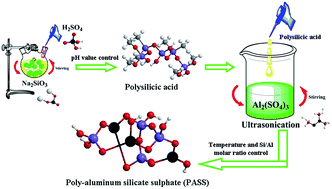Synthesis and characterization of poly-aluminum silicate sulphate (PASS) for ultra-low density fiberboard (ULDF)
Abstract
Poly-aluminum silicate sulphate (PASS) was synthesized in a mixed aqueous solution of sodium silicate and aluminum silicate via a sol–gel method for use in ultra-low density fiberboard (ULDF). The preparation conditions were optimized by using response surface methodology. The effects and interactions of the Si/Al molar ratio (X1), pH value (X2) and temperature (X3) on the internal bond strength of ULDF were investigated. Research showed that the optimum internal bond strength (10.23 ± 0.64 kPa) was obtained under a Si/Al molar ratio of 2 : 1, pH value of 8, and a temperature of 50 °C. Analyses of the Fourier transform infra-red spectroscopy spectra confirmed that Al–O–Si bonds were formed between polysilicate and Al or its hydrolysate. The particle size analysis showed that the average size of PASS was 7.52 μm. Some of the PASS entered the cell wall and made a contribution to the improvement of the mechanical properties of ULDF.


 Please wait while we load your content...
Please wait while we load your content...